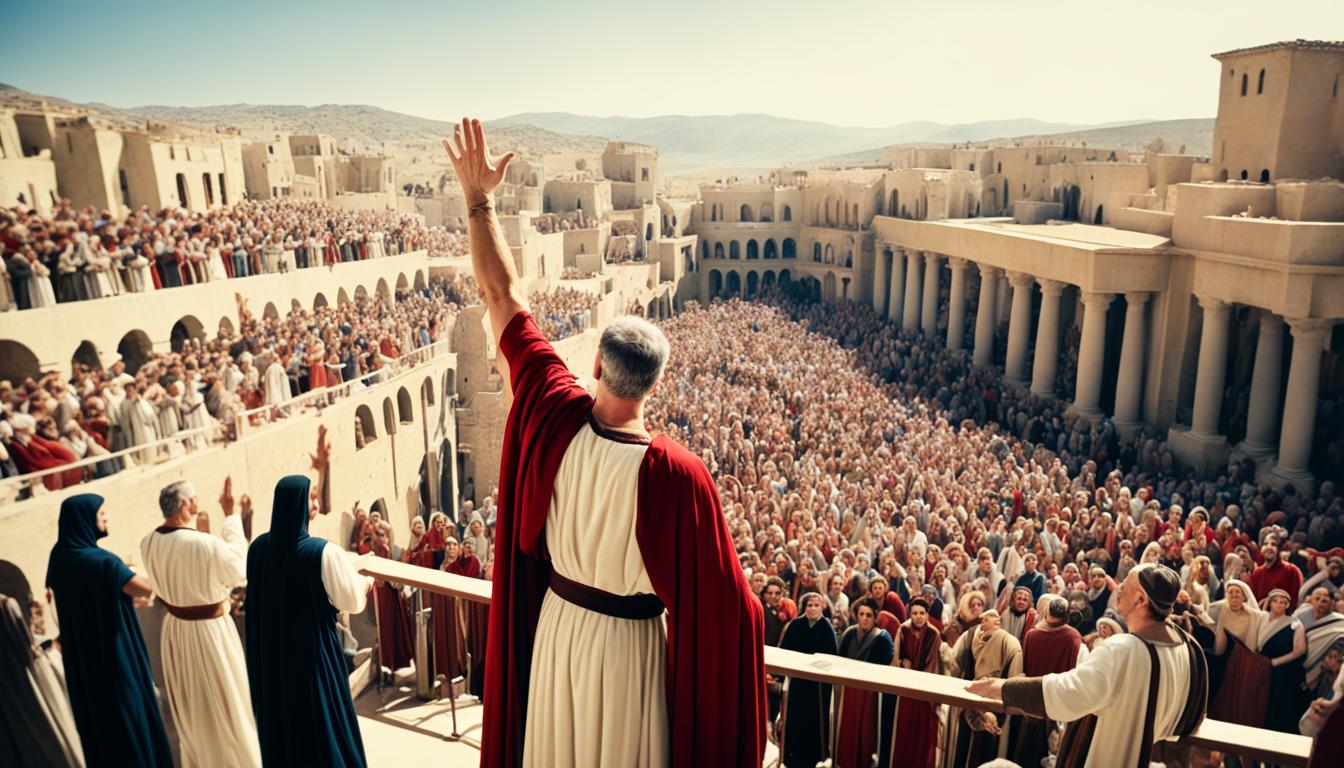Pontius Pilate, a figure mentioned in the Bible, holds significant historical and religious importance. As the Roman prefect of Judaea from 26-36 CE, Pilate played a pivotal role in the trial and crucifixion of Jesus Christ.
The New Testament and historical accounts shed light on the complex nature of Pilate’s involvement. Despite finding no guilt in Jesus, Pilate succumbed to public pressure and ordered his crucifixion. This act has shaped the narrative and theology of Christianity.
Key Takeaways:
- Pontius Pilate was the Roman prefect of Judaea and played a pivotal role in the trial and crucifixion of Jesus.
- According to historical accounts and the New Testament, Pilate found no guilt in Jesus but ordered his crucifixion due to public pressure.
- Pontius Pilate’s involvement in the crucifixion remains significant in Christian history and theology.
- While the New Testament portrays Pilate as vacillating, historical records suggest he was a strict and authoritarian leader.
- Pilate’s decision to order the crucifixion of Jesus continues to shape the narrative and beliefs of Christianity.
Historical Accounts of Pontius Pilate
According to historical accounts, Pontius Pilate played a significant role in Jesus’ trial and crucifixion. As the appointed prefect of Judaea, Pilate had the authority to preside over legal proceedings and make critical decisions.
During his tenure, Pilate’s actions often antagonized the Jewish population. He promoted Roman religion and emperor worship, which caused unrest and led to riots among both Jews and Samaritans. This provoked tensions between the local communities and the Roman authorities.
“Pilate was a strict authoritarian leader who provoked and executed men without proper trial.”
Historical records indicate that Pontius Pilate’s position of power was solidified through the support of Sejanus, a trusted associate of the Roman Emperor Tiberius. However, when Sejanus fell from grace, Pilate faced increased criticism and scrutiny. Eventually, he was summoned back to Rome to stand trial himself.
While Pontius Pilate’s exact fate remains uncertain, the historical accounts portray him as a strict and authoritarian leader. His decision-making, execution of men without proper trial, and the promotion of Roman customs over local traditions contributed to the complex dynamics and tension during his tenure in Judaea.
Gospel References to Pontius Pilate
The New Testament of the Bible provides several references to Pontius Pilate. The Gospel accounts portray him as the Roman official responsible for Jesus’ trial and crucifixion.
Pilate initially finds no guilt in Jesus and attempts to free him. However, under pressure from the crowd and the Jewish religious leaders, he ultimately agrees to the crucifixion. Pilate’s involvement in this pivotal event in Christianity is documented in the Gospels of Matthew, Mark, Luke, and John.
These Gospel references highlight the significant role Pontius Pilate played in the crucifixion of Jesus and emphasize the historical and theological importance of this event.
| Gospel | Chapter | Verse |
|---|---|---|
| Matthew | 27 | 11-26 |
| Mark | 15 | 1-15 |
| Luke | 23 | 1-25 |
| John | 18 | 28-40, 19:1-16 |
Pontius Pilate in the New Testament
The New Testament provides important insights into the character of Pontius Pilate. The Synoptic Gospels depict Pilate as initially reluctant to crucify Jesus, finding no grounds for the death penalty and even declaring Jesus not guilty.
However, as the story unfolds, Pilate succumbs to political pressure and allows the crowd to choose the release of a criminal, Barabbas, over Jesus. Pilate eventually authorizes the flogging and crucifixion of Jesus, washing his hands of responsibility but ordering the charge against Jesus to be posted on the cross.

“I find no guilt in this man.” – Pontius Pilate
The portrayal of Pilate in the New Testament suggests a vacillating and weak leader who prioritized appeasing the crowd over upholding justice.
Different Perspectives on Pontius Pilate
Different historical and traditional accounts vary in their assessment of Pontius Pilate. While Josephus and Philo of Alexandria portray Pilate as a corrupt and cruel leader who disregarded Jewish customs, some early Church traditions took a more favorable view of him. In the Ethiopian Orthodox Tewahedo Church, Pilate and his wife are venerated, and there is a belief that he tried to convert the Emperor Caligula to Christianity. The significance of Pontius Pilate lies in his role as the Roman official who made the decision to crucify Jesus, a pivotal event in Christian theology.

Historical Accounts of Pontius Pilate
According to historical accounts, Pontius Pilate was appointed as the prefect of Judaea through the support of Sejanus, a favorite of the Roman Emperor Tiberius. During his tenure, Pilate antagonized the Jewish population by promoting Roman religion and emperor worship, causing riots among both Jews and Samaritans. After Sejanus fell from power, Pilate faced increased criticism and was eventually called back to Rome to stand trial himself. The historical records suggest that Pilate was a strict authoritarian leader who provoked tensions and executed men without proper trial.
| Perspective | Description |
|---|---|
| Josephus | Portrays Pilate as a cruel leader who disregarded Jewish customs. |
| Philo of Alexandria | Describes Pilate as a corrupt and oppressive governor. |
| Early Church traditions | Take a more favorable view of Pilate and venerate him in some religious practices. |
The Disappearance of Pontius Pilate
After his rule as the prefect of Judaea, Pontius Pilate disappears from historical records. According to accounts by Josephus and Tacitus, Pilate was removed from office and sent back to Rome after using excessive force to suppress a suspected Samaritan insurrection. The exact details of Pilate’s fate remain uncertain, with some traditions suggesting he was executed by the Emperor Caligula or committed suicide. The limited historical information on Pontius Pilate underscores the significance of his role in the crucifixion of Jesus, as documented in the Bible.

| Key Points | Details |
|---|---|
| Removal from Office | After a series of controversial actions, Pontius Pilate was removed from his position as the prefect of Judaea. |
| Return to Rome | Pilate was sent back to Rome to face potential consequences for his actions. |
| Uncertain Fate | The exact details of what happened to Pontius Pilate after his return to Rome are uncertain, with differing traditions speculating about his execution or suicide. |
| Historical Significance | Despite the limited historical information, Pilate’s role in the crucifixion of Jesus remains a significant event in both biblical and historical accounts. |
Conclusion
The role of Pontius Pilate in the Bible and historical accounts highlights the complex and pivotal nature of his involvement in the crucifixion of Jesus. While the New Testament portrays Pilate as vacillating and weak, historical records suggest a strict and authoritarian leader.
The significance of Pontius Pilate lies in his decision to order the crucifixion of Jesus, an event that holds immense importance in Christianity. Whether viewed as a cruel leader or a figure caught in political circumstances, Pontius Pilate’s actions continue to shape the narrative and theology of the Christian faith.
Pontius Pilate’s role in the crucifixion of Jesus is a testament to the power dynamics and moral dilemmas inherent in historical events. His actions and the subsequent events have left a lasting impact on the Christian faith, shaping the way believers understand and interpret the sacrifice of Jesus. The complex portrayal of Pilate in both biblical and historical accounts invites reflection on the consequences of personal choices and the role of empathy and justice in the face of public pressure.







